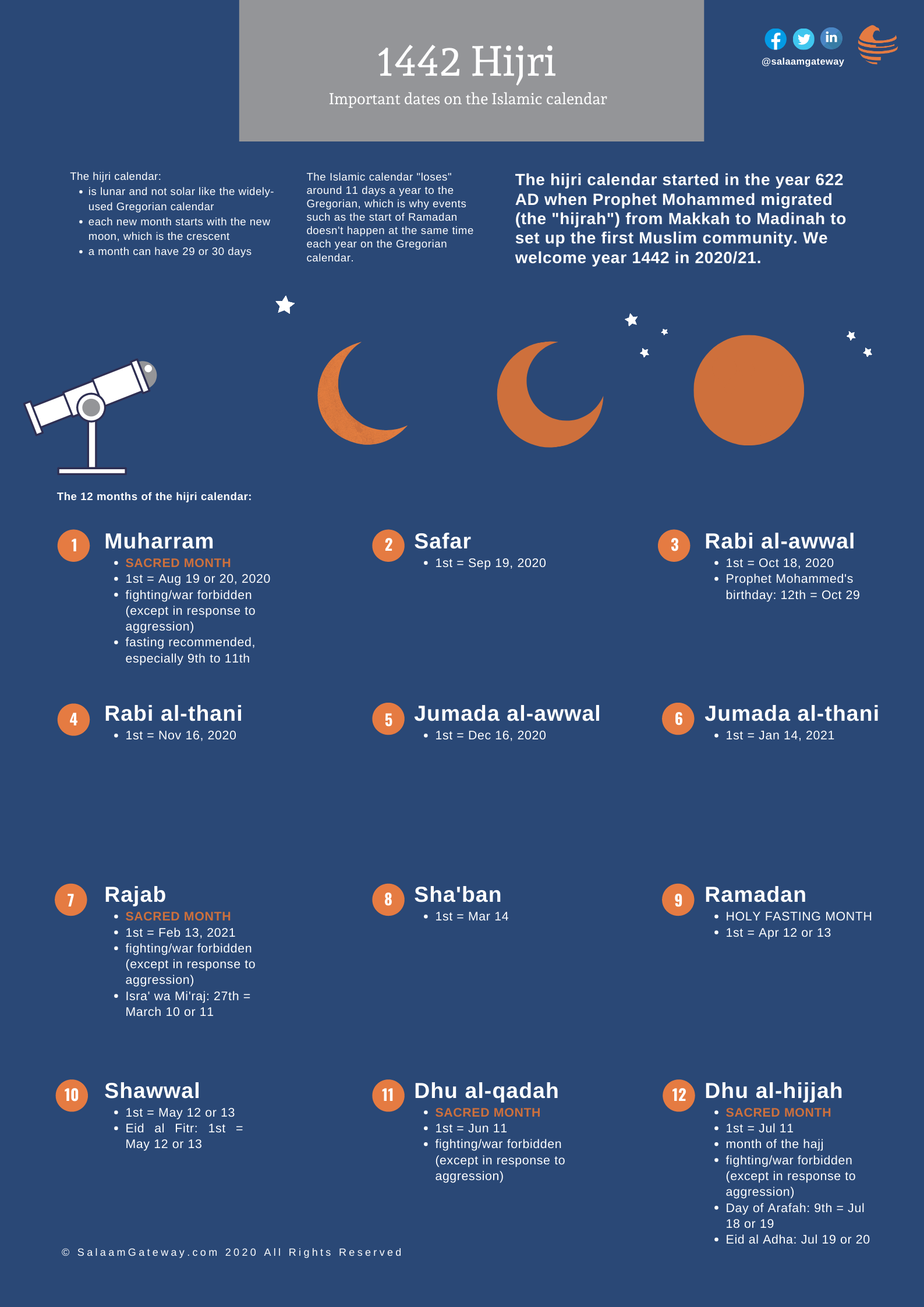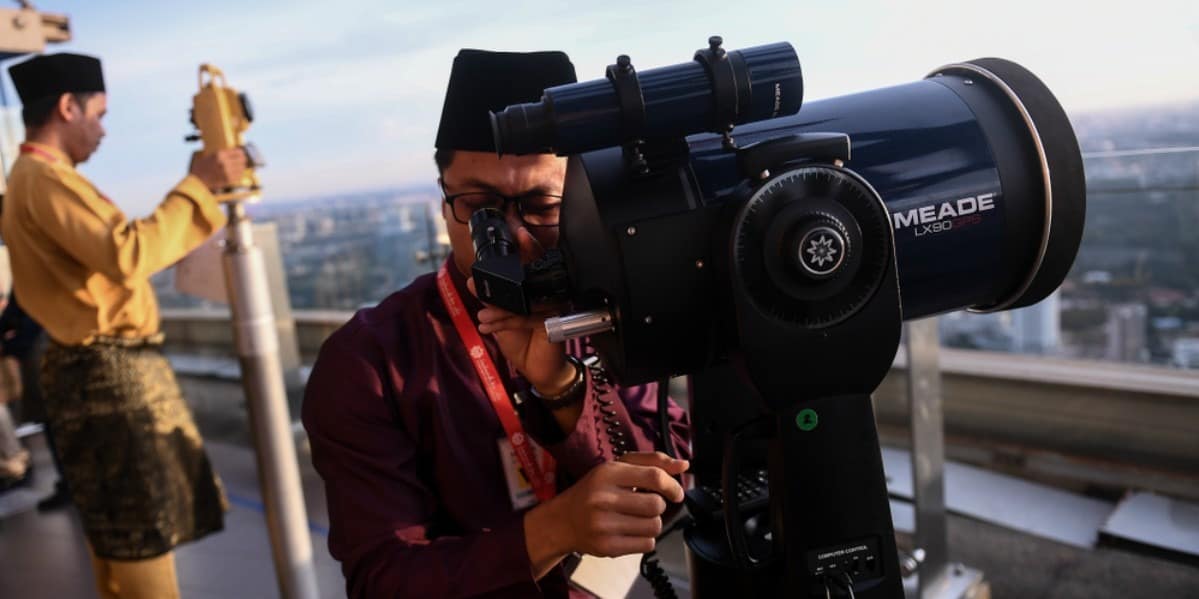#LetsGoHijri: New campaign wants Muslims to align their lives more closely to Islamic calendar

We will welcome the start of the new Hijri year 1442 on Thursday (August 20) or Friday this week. Muslims in the modern and contemporary era use the Islamic, or Hijri, calendar primarily to track the key events of Ramadan, Eid al Fitr, Hajj, and Eid al Adha. A new campaign wants Muslim-majority countries, institutions, and professionals to “revive” a “Hijri-first lifestyle”, with the Islamic calendar playing a more central role.
Mohammed Faris, CEO of the ProductiveMuslim Company which is leading the campaign, told Salaam Gateway that Muslims aligning their lives with the Hijri calendar might seem “inconvenient and impractical” but if “active steps” are taken to resolve some of the practical challenges, Muslims could “unlock immense spiritual, social, and economic benefits for all”.
In an impassioned article on the ProductiveMuslim website ahead of the campaign launch, Mohammed wrote: “We live in a world where spirituality is removed from public space and hidden into private corners. Time is governed by clocks and a Gregorian calendar that’s devoid of spiritual meaning or significance. The Islamic calendar instead connects us to the spiritual realm through time and helps us organize our time into sacred and non-sacred days and months.”
Mohammed told Salaam Gateway the #LetsGoHijri campaign, launched on August 12, is part of a new platform called GoHijri.org. ProductiveMuslim is incubating GoHijri.org and plans to establish it as an independent, non-profit, research and advocacy think-tank for the Hijri calendar.
The work of GoHijri will focus on three areas:
- research to understand the practical challenges and potential solutions to adopt the Islamic calendar,
- advocacy to raise awareness about the importance and practical ways to adopt the hijri calendar, and
- creating an enabling environment to support the development of tech and non-tech solutions for adopting the calendar.
Mohammed says the plan is to hold a “Hijri Hackathon” and live webinars with Islamic calendar experts, with the possibility of a #GoHijri conference.
He also sees an Annual GoHijri index in the future, meant for governments and corporates to measure how much of their external and internal communication and processes are aligned with the Islamic calendar as well as "How to #GoHijri Guides" for individuals, companies, and schools.
Q&A with Mohammed Faris, CEO of ProductiveMuslim Company:
1. Salaam Gateway: The #LetsGoHijri campaign was launched on August 12, or Dhu al-hijjah 22. How has response, in terms of numbers, been so far?
Mohammed Faris: In 24 hours from the launch of the campaign, we had hundreds of applicants signing up for the campaign and we expect to hit a few thousand by the end of the first phase of this campaign (which will last 30 days).
2. Salaam Gateway: How has reaction to your argument for the revival of the use of the Hijri calendar and campaign been so far?
Mohammed Faris: Very positive! Many people just haven't thought about the critical importance of the Islamic Hijri calendar in their personal and professional lives. It's such a simple yet ubiquitous system that's easily ignored and taken for granted. We're raising awareness that we need to actively take it more seriously and align our lives with it.
3. Salaam Gateway: Have you meet with any strong negative responses?
Mohammed Faris: So far, none. However, I do expect people to raise practical challenges to use the Hijri calendar and how it fits in modern society. That's what we want to discuss and deal with head-on, instead of dropping the ball on the Hijri calendar because it's "inconvenient".
4. Salaam Gateway: There is some attempt in your article to justify the revival and use of the Islamic calendar for economic benefits. What are the key economic benefits?
Mohammed Faris: Many companies operating in the Islamic Economy see a boost in business during the special seasons of the Islamic calendar such as Ramadan, Eid, and Hajj. So we are already seeing the economic benefits of aligning economic activity to special seasons of the Islamic calendar.
What we'd like to see is a comprehensive adoption by companies (especially those operating in the Islamic economy) of the Islamic calendar in business communication, planning, and processes. For example, companies can actively plan for Ramadan starting Rajab, instead of panicking that Ramadan is around the corner and they haven't prepared for it because they weren't keeping track of the Hijri calendar.
From a workforce/employee engagement perspective, a company can boost morale by switching to paying staff in the Hijri calendar since the staff will get a one-month bonus salary every two years due to the Hijri calendar being 11 days shorter than the Gregorian.
5. Salaam Gateway: One key aspect of the Islamic calendar is that moon sighting differs from country to country and so we end up with countries celebrating Eld al Fitr on different days, for example. What is the case or argument for this? How is this a positive or benefit, or is this just in the way of a unity of the ummah?
Mohammed Faris: We acknowledge these challenges but we don't want them to stand in the way of adopting a Hijri-first lifestlye. The best Hijri calendar system is the one someone will use regularly.
We also want to differentiate between a ‘civil’ Islamic calendar that is calculated astronomically and a religious calendar that remains dependent on month-to-month local or global moon sighting. The civil calendar can be used for planning purposes and the religious one for the rituals of Ramadan, Hajj, etc.
6. Salaam Gateway: Your article addresses Muslim achievement in certain sciences because of Islamic requirements. Do you see any other need that Muslims need to fulfil with regard to Islamic requirements that we haven't already achieved?
Mohammed Faris: Absolutely! For example, I believe if we seriously adopt the Hijri calendar as our primary calendar - we can then put our intellectual, technical, and financial capacities to resolve some of the practical challenges the Hijri calendar poses to us today including how to set up online meetings across different time zones with people who follow different Hijri calendar calculation methods - something that our ancestors didn't have to worry about since they didn't operate in a globalized world with instant communication capabilities.
7. Salaam Gateway: Is there any fear or apprehension on your part, and as well on the part of the people that you've reached out to, that the call to "revive" the use of the Islamic calendar in more aspects of Muslims' lives is tantamount to pushing an "Islamist" agenda?
Mohammed Faris: The Hijri calendar is a non-political time system that was adopted for fifteen centuries from Indonesia to Spain. Moreover, being a strictly lunar calendar means its independent from any political interference (this is unlike the Roman, Julian, and Gregorian calendar, which were used as political instruments).
We are not calling for the abandonment of the Gregorian calendar; this will not be sensible, nor feasible, especially we live in a globalized society.
We are calling for the revival of a Hijri-first lifestyle. where the Islamic calendar plays a central role in organizing our spiritual, economic, and social lives aligned with our values and Islamic rituals.
© SalaamGateway.com 2020 All Rights Reserved
